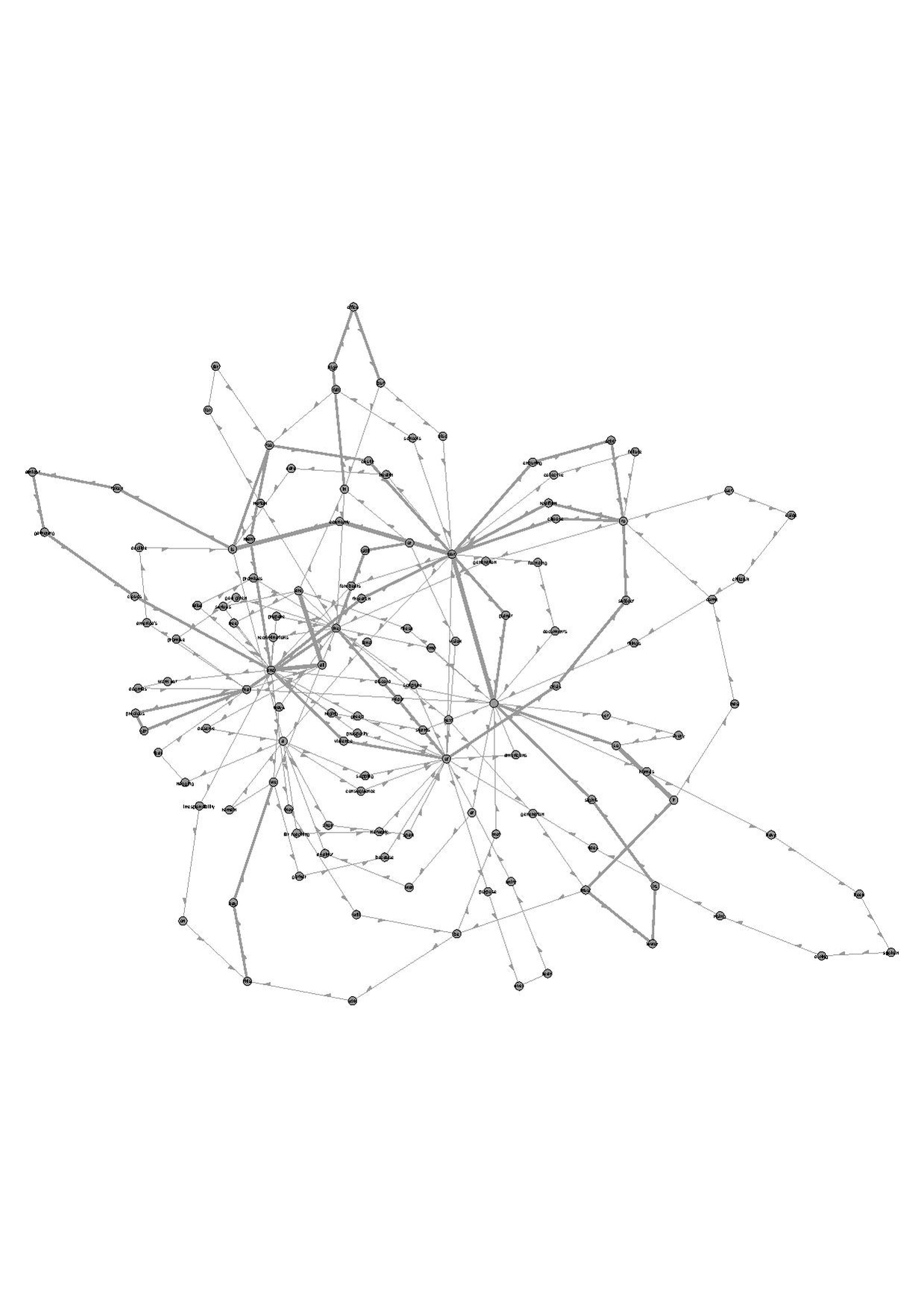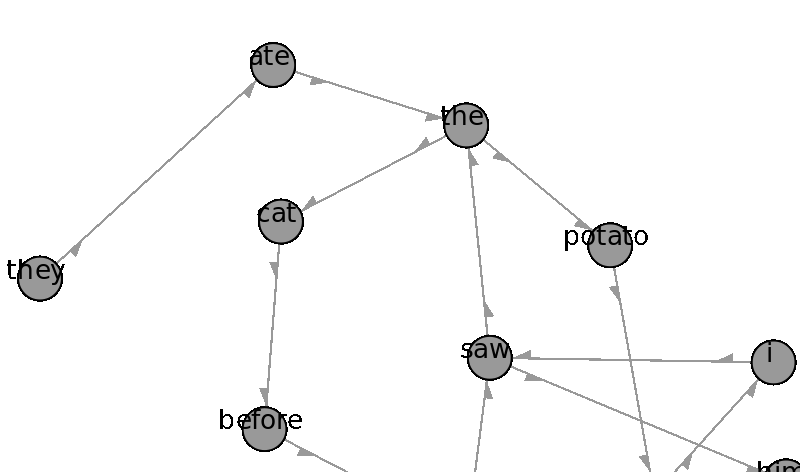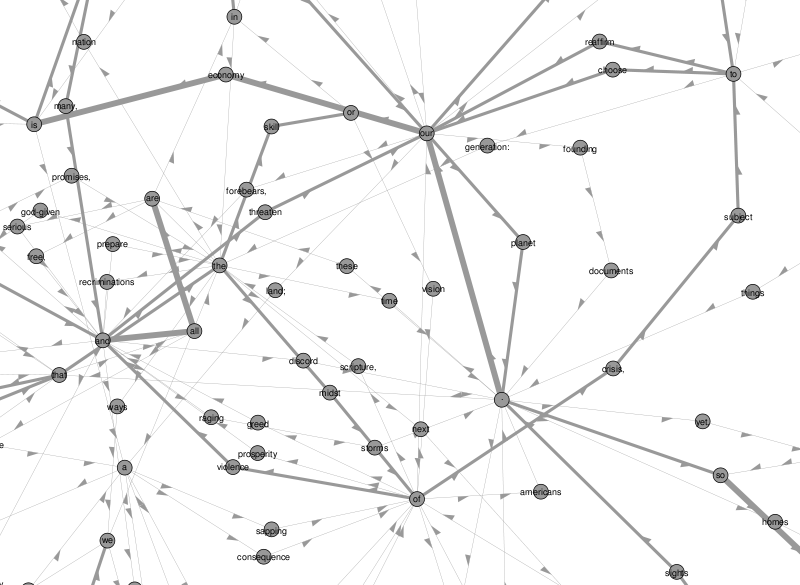User:Laurier Rochon/prototyping/graphov: Difference between revisions
No edit summary |
No edit summary |
||
| Line 14: | Line 14: | ||
Using the following sentence : ''They ate the cat before he saw the potato. He knew it. I saw him.'' | Using the following sentence : ''They ate the cat before he saw the potato. He knew it. I saw him.'' | ||
Click [[File:2. | Click [[File:2.jpg | HERE]] for the full image (not much bigger) | ||
[[File:gephi1.gif]] | [[File:gephi1.gif]] | ||
Revision as of 14:33, 21 May 2011
Visualizing markov chains
(work in progress)
Some notes
- I'm skeptical of 'data visualization', 'infographics' and the like. Furthermore, I don't feel completely qualified to draw conclusions from the more extensive graphs.
- I guess I consider this as a quick prototyping tool just to get a general overview of what's going on in a large set of data
- Graphs are ugly? Yes. My computer is slow.
- All done using Gephi, which is free and works pretty well. They use mainly a '.gexf' format, which is similar to XML to generate the graphs. Unfortunately, the documentation for this software blows.
Ex1 : the original markov chain
Using the following sentence : They ate the cat before he saw the potato. He knew it. I saw him.
Click  for the full image (not much bigger)
for the full image (not much bigger)
Ex2 : using Obama's inaugural speech
Using the remix from Obama's speech (here)
Click  for the full image (PDF)
for the full image (PDF)
Soft stuff
This generates the file to throw into Gephi
import random
text = 'They ate the cat before he saw the potato.He knew it.I saw him.'
text = text.replace('.',' . ').lower()
words = text.split()
d = {}
sents = text.split('.')
data = '<?xml version="1.0" encoding="UTF-8"?>\n<gexf xmlns="http://www.gexf.net/1.2draft" version="1.2">\n <meta lastmodifieddate="2009-03-20"> \n <creator>lolo</creator> \n <description>markov chains</description> </meta> \n <graph mode="static">'
c = 0
data = data + '<nodes>\n'
for w in words:
if w not in d:
d[w] = c
data = data + '<node id="'+str (c)+'" label="'+str (w)+'" />\n'
c=c+1
data = data + '</nodes>\n'
data = data + '<edges>\n'
e = 0
for w in words:
if e<len(words)-1:
data = data + '<edge id="'+str (e)+'" source="'+str (d[words[e]])+'" target="'+str (d[words[e+1]])+'" />\n'
e = e+1
data = data + '</edges>\n'
data = data + '</graph>\n</gexf>\n'
f = open('mc.gexf','w');
f.write(data)
f.close()
Specifically, this :
<?xml version="1.0" encoding="UTF-8"?>
<gexf xmlns="http://www.gexf.net/1.2draft" version="1.2">
<meta lastmodifieddate="2009-03-20">
<creator>lolo</creator>
<description>markov chains</description> </meta>
<graph mode="static"><nodes>
<node id="0" label="they" />
<node id="1" label="ate" />
<node id="2" label="the" />
<node id="3" label="cat" />
<node id="4" label="before" />
<node id="5" label="he" />
<node id="6" label="saw" />
<node id="7" label="potato" />
<node id="8" label="." />
<node id="9" label="knew" />
<node id="10" label="it" />
<node id="11" label="i" />
<node id="12" label="him" />
</nodes>
<edges>
<edge id="0" source="0" target="1" />
<edge id="1" source="1" target="2" />
<edge id="2" source="2" target="3" />
<edge id="3" source="3" target="4" />
<edge id="4" source="4" target="5" />
<edge id="5" source="5" target="6" />
<edge id="6" source="6" target="2" />
<edge id="7" source="2" target="7" />
<edge id="8" source="7" target="8" />
<edge id="9" source="8" target="5" />
<edge id="10" source="5" target="9" />
<edge id="11" source="9" target="10" />
<edge id="12" source="10" target="8" />
<edge id="13" source="8" target="11" />
<edge id="14" source="11" target="6" />
<edge id="15" source="6" target="12" />
<edge id="16" source="12" target="8" />
</edges>
</graph>
</gexf>


